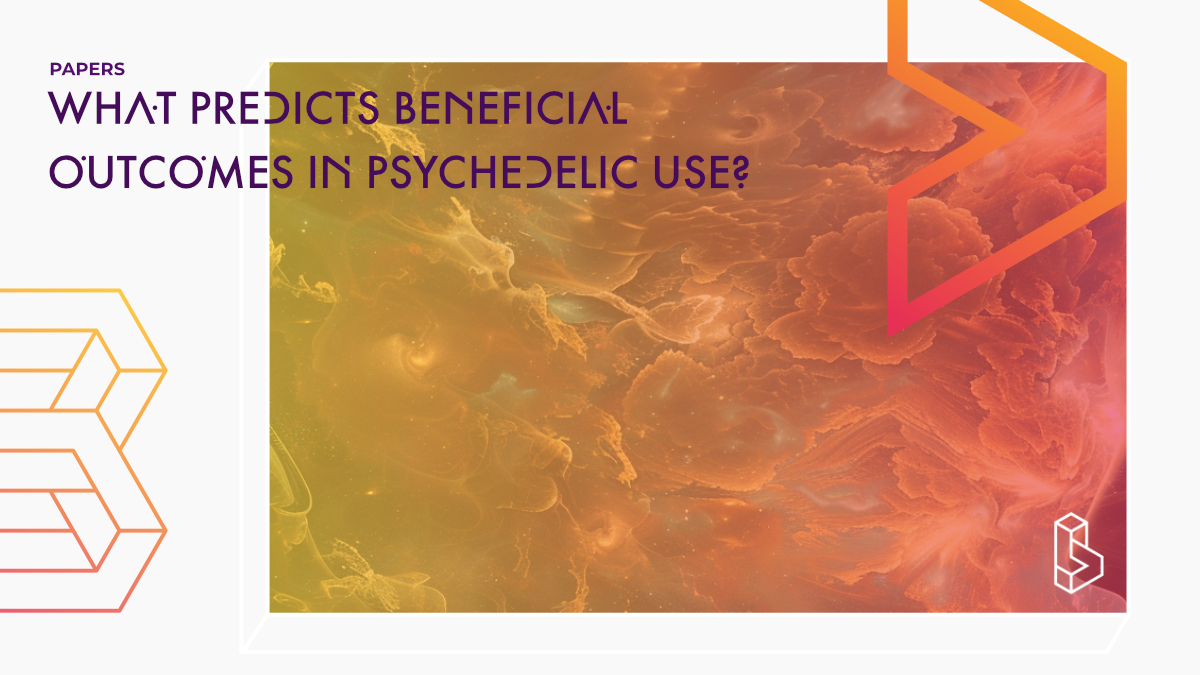This analysis (n=240) of online trip reports examines the mechanisms behind the therapeutic potential of psychedelics, comparing metaphysical belief theory and predictive self-binding theory. Path analysis and structural equation modelling reveal that psychological insight, rather than metaphysical beliefs, uniquely predicts beneficial outcomes. Additionally, the positive effects of ego dissolution and therapeutic intent on beneficial outcomes are fully mediated by psychological insight, thereby supporting the predictive self-binding model over the metaphysical belief theory.
Abstract of What Predicts Beneficial Outcomes in Psychedelic Use?
“Interest in psychedelics and their possible therapeutic potential has been growing. Metaphysical belief theory asserts that these benefits stem from the adoption of comforting supernatural beliefs following a mystical experience. By contrast, predictive self-binding theory suggests that the beneficial outcomes of psychedelics are primarily driven by psychological insights. The present study tests these competing models of psychedelic benefits. We conducted a quantitative content analysis on unsolicited self-reports of psychedelic users available on Erowid.org, to examine the potential relations between psychological insight, ego dissolution, therapeutic intent, altered metaphysical belief, and enduring health outcomes. We randomly selected, coded, and analyzed two hundred forty psychedelic experience reports from the website. Path analysis using structural equation modeling showed that psychological insight, not metaphysical beliefs, uniquely predicted beneficial outcomes. Moreover, beneficial outcomes’ positive relation to ego dissolution and therapeutic intent was fully mediated by psychological insight. These findings support the predictive self-binding model over the metaphysical belief model.”
Authors: Elias C. Acevedo, Scott Uhler, Kaitlyn P. White & Laith Al-Shawaf
Summary of What Predicts Beneficial Outcomes in Psychedelic Use?
Psychedelics are a group of serotonergic psychoactive substances that are traditionally comprised of two subgroups, phenethylamines (e.g., mescaline) and tryptamines (e.g., psilocybin). The present study tested two competing models of psychedelic benefits, namely metaphysical belief theory and predictive self-binding theory.
Metaphysical belief theory
A recent study found that mystical experience is a key predictor of positive responses to psychedelic therapy, and that adopting comforting non-naturalist beliefs following a mystical experience is a key driver of beneficial outcomes.
People attribute psychedelic benefits to perspective-shifts in their personal and relational lives as much as to the mystical content of their experience, and psychological insight is a stronger predictor of beneficial outcomes than mystical experience.
Predictive self-binding theory
Find this paper
https://doi.org/10.1080/02791072.2024.2314729
Paywall | Google Scholar | Backup | 🕊
Cite this paper (APA)
Acevedo, E. C., Uhler, S., White, K. P., & Al-Shawaf, L. (2024). What predicts beneficial outcomes in psychedelic use? A quantitative content analysis of psychedelic health outcomes. Journal of Psychoactive Drugs. https://doi.org/10.1080/02791072.2024.2314729
Study details
Participants
240
Humans

